Craft Notes
What to call a zombie when? Some tools to assist with period-accurate writing
Over at io9 there’s this post, “How to make sure the language in your historical fantasy novel is period-accurate.” And while “fantasy novel” and “period-accurate” seem contradictory to me, I was happy that the article directed me to two interesting online resources that may also interest . . . you!
1. The Jane Austen Word List: Author Mary Robinette Kowal compiled a list “of all the words that are in the collected works of Jane Austen” (14,793!). You can install it as a “language” in OpenOffice (click here for instructions), then spell check your document against it, which will highlight any words that Austen didn’t use. (Kowal: “It also includes some of Miss Austen’s specific spellings like ‘shew’ and ‘chuse.'”) This would obviously be useful for anyone who wants to write a project using only Austen’s vocabulary. And assuming that Kowal didn’t slip up, we can see that Ms. Austen’s works are zombie-free, the only z-initial words that she used being zeal, zealous, zealously, and zigzags. (Sorry, Seth Grahame-Smith.)
2. The Google Ngram Viewer: This allows you to see check how frequently a word appears over time in any book that Google Books documents. So, for instance, here are the results for “zombie”:
Thus, while it would certainly be all right to have a zombie appear in a novel set before 1920, if you want to remain period-accurate, none of the other (English-speaking) characters should know to call the thing that.
. . . So those were the tools linked to at io9. But I wrote this post mainly because I wanted to call attention to another, related tool:
3. The Historical Thesaurus of the OED: The online version of this isn’t free, true, but you can find a bound copy in many libraries (and many schools provide online access). More than forty years in the making, this thesaurus tells you when a word was a synonym for another word (or since when). Thus, if your zombie novel were set in the 15th century, its monsters could be referred to as “carrion,” that term having once been “applied to a dead man or corpse that ‘walks’ or returns to earth” (but which has since then become obsolete).
. . . Know of any other tools such as these? If so, please do chime in. Meanwhile, here’s hoping that these links help any historical fiction writers out there out!
Bonus: Here’s how Charles Dickens describes a zombie in Oliver Twist: “a corpse endowed with the mere machinery of life” (Chapter 48, “The Flight of Sikes”).
Tags: Charles Dickens, Historical Thesaurus of the OED, jane austen, Oliver Twist, Seth Grahame-Smith, zombies


“Zombi” (no e) gets plenty of hits prior to 1930.
So it does—thanks! & I just looked it up in the OED, where the first mention is from 1819:
The next mention is from the 1870s—and note, too, that the Google Ngram spikes then.)
1. I enjoy the idea – and fact – of enabling the fantasy that the world one is reading is authentic by making its language feel historically appropriate–bqhatevwr the numberless reasons that such a feeling is fictive and unreal and impossible and false and dangerously seductively made-up. (All of the fantasies about words corresponding to reality are fantastic; they still admit of more or less disclosure, more or less discovery-as-opposed-to-imposition.)
Two things about the Austen word-list: a) As a commenter on the thread at io9 points out, the words all being demonstrably Austenian doesn’t make the texture of the writing ‘like Austen’. At least equally effective is the rhythm of the prose–how the syntactic coherence within the sentences and the narrative coherence between them feels as one processes the habits of word order, clausal connection, prepositional phrases vs. adverbs, and so on. This similarity to or contrast with Austen’s texture is the writer’s ear’s contribution, a matter of the forensically distant exertion of the writer’s taste.
b) More to the point of word choice, just because Austen didn’t use a word, or use it in a particular way, in her writing doesn’t require that she never used nor would reasonably have used that word. You might have to dump Walter Scott into your word-hoard, you probably should consider Johnson’s Dictionary… hell, you might have to allow all the words in English back to Spenser (which any English reader ca. 1815 might have come across and remembered). So how do you want your Regency novel to match up with Austen? –simply on the grounds of intelligibility – that she’d ‘naturally’ understand every locution?
It’s a weird ambition, to write a novel Austen would easily read, or to put a Connecticut Yankee in 6th c. ‘Britain’, but weirdness is no reason not to. –it’s weird to tell someone about the car accident you saw yesterday and expect your telling to put them imaginatively–fictively–right there.
These are all excellent points.